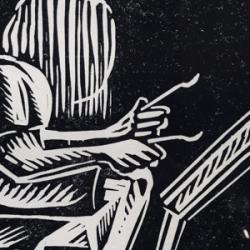 When I listen to Rich Mullins’ music (and I still listen), he makes me want to go camping. It’s weird, I know, but it always seems like I could more easily imagine the world he imagined if I could just get off the grid for awhile. And I want to imagine the world that he imagined.
When I listen to Rich Mullins’ music (and I still listen), he makes me want to go camping. It’s weird, I know, but it always seems like I could more easily imagine the world he imagined if I could just get off the grid for awhile. And I want to imagine the world that he imagined.
Rich used to joke during concerts that in the imagination of his fans he lived on the edge of rivers lighting campfires (the cover of one of Rich’s popular records showed him doing just this). It was an illusion, and Rich loved nothing more than dissing our illusions for us.
I don’t think I feel this way about Rich, even after all these years, because I’m hooked on an illusion. Back when I was touring with Satellite Soul, we toured with Mitch McVicker (and Cobra Joe, and Brad Lahyer) often for several years. I spent many nights smoking cigarettes under the stars, buying them beers to try to get them to tell me one more story about Rich. I think I have a pretty decent picture of the man. I feel this way about Rich because he had his eyes wide open about the world in which we lived. He embraced the darkness as well as any poet. He knew pain. He knew struggle. Rich did not see the world in black and white. He saw the world in deep, rich, velvety colors and textures–the very colors and textures he wrote into his songs. That’s the world I want to live in. That’s the world I want to imagine.
As a rail-thin pimple-faced high school kid prone to spending long lonely hours in my room playing piano and guitar I lived with an intense longing for I didn’t know what. Rich helped me interpret the longing, and my experience of the world. He helped me to root the longing in an ancient story. He insisted, he argued, he wrote amazing songs to illustrate that the world is enchanted. “I do not meet God in a vacuum,” Rich wrote. “I meet Him in the world He has provided for me to meet Him in – in a world of events and of places, of history (time and space), in a world of lives of people and their records of their encounters. I meet God in this world – in the world of these things…”
Rich lived at the intersection of his own inescapable brokenness, and the brokenness of the world, and the hope that we were not left here alone to struggle in the darkness without any help. Night after night Rich would play his songs for an audience for which he felt equal parts compassion, love, and disgust. I sometimes think it was Rich’s deep love of the physical world, the planet, the wonder of this place that we live that kept him from being terminally cynical.
Rich had an uncanny ability to describe the world as an enchanted place of wonder and awe and mystery. “I do not work myself into some ecstatic frenzy to meet God.” he said. “God does not speak to me through opium dreams or out of hypnotic trances. He meets me in history and takes me beyond it to Himself. Any “mysticism” that is authentic does not abregate time and space – it infuses those elements with meaning. Time and space – that is the world.”
Rich was disgusted by people who lived without compassion. He railed against the politics of greed and the Christian right. He did this not to be like James Dean. He did this because Rich could see what we couldn’t see. “Look at us all – we are all of us lost and in all of our different ways of pretending, we all fool ourselves into the very same hell. Look at the cross – we are all of us loved and one God meets us all at the point of our common need and brings to all of us – all who will let Him – salvation.”
I’m almost forty-six years old now, five years older than Rich was when he died, and if I live to be eighty-six I’ll never be as wise as he. And if I live to be eighty-six I will never stop missing him. I will never stop repeating the final line from A Prayer For Owen Meany, that Rich once told me I should read: “O God—please give him back! I shall keep asking you.”
This is one of my favorites:













